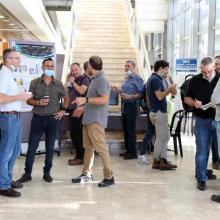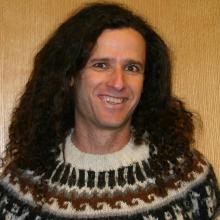News
-
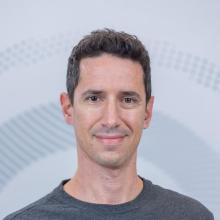
Mission: Promote Science
Meet Dr. Ofir Lindenbaum, who specializes in Machine Learning and develops algorithms that can improve scientific research in almost any field—from discovering new drugs for cancer, to predicting floods
-
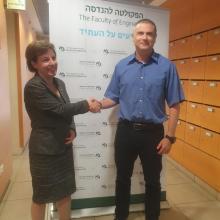
The Minister’s Visit
Republic of Kosovo’s Minister of Foreign Affairs and Deputy Prime Minister, Ms. Donika Gërvalla, VISITED THE Faculty of Engineering this month. Minister Gërvalla met with Dean Zalevsky to discuss a possible collaborative program with students from Kosovo. The Kosovo students will attend the Faculty of Engineering’s lessons via Zoom, in order to improve their training in digital engineering.
-
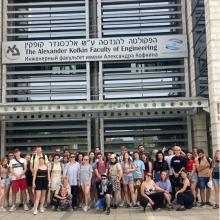
SELA at the Faculty of Engineering
Some 50 new immigrants from Russia and Ukraine, participants of the Jewish Agency’s SELA program, visited Bar Ilan University and learned about their options for a bachelor’s degree. The tour, organized by the International School at Bar Ilan, the prospective students were advised about programs offered in English and the tracks offered at the Faculty of Engineering.
-
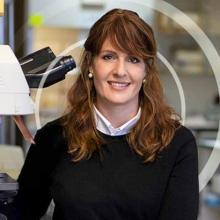
“A medical revolution”
Groundbreaking technology developed in Prof. Rachela Popovtzer’s lab, used for creating a new generation of engineered, nano-particle-based drugs, allows biological drugs to bypass the blood-brain barrier. This may revolutionize the treatment of neural disorders such as Alzheimer’s, Parkinson’s, and different types of cancer
-

My Computer and I Went to the Movies
Last month Prof. Zvi Lotker was named winner of the Rector’s Prize for Scientific Innovation for his newest book where he explores the narrative analysis of stories, plays, and movies via dialogues with his computer. Read what he has to say about the book, see how working with a computer can shed light even on old classic creations, and learn why he believes machines will never truly replace humans.
-
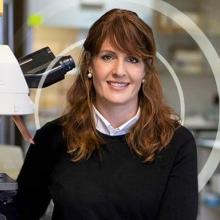
Delivering CRISPR Biomolecules to the Brain
Prof. Rachela Popovtzer receives ERC grant to develop a cure for rare genetic brain diseases
-
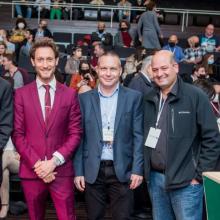
A peek into the alumni conference A peek into the alumni conference
Held earlier this month to mark the Faculty of Engineering’s 20th anniversary, the alumni conference was an immense success.
-

Brain Power
Dr. Yaara Erez decodes brain signals from various imaging techniques and attempts to understand how they relate to functioning and thinking processes. Her breakthrough research made it all the way to the BBC.
-
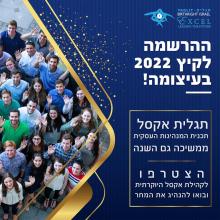
Birthright Israel Excel Wants You
Bachelors students aged 22–26? Birthright Israel Excel, Birthright Israel’s business leadership branch, wants you. On the agenda: accompanying students from leading universities around the world this summer.
-
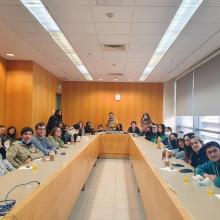
MASA – A Journey through the Faculty of Engineering
Late last month, the Faculty of Engineering brought together 37 young French men and women who are currently part of the MASA Progress program and are considering relocating to Israel and studying here.
-

What’s French for Cheshire Cat?
At the end of October, Dr. Eli Cohen gave the opening lecture at the Foundations of Physics conference. This in-depth look into the fundamentals of quantum theory was covered by the French newspaper, Le Monde
-
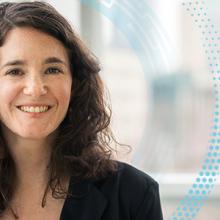
At the intersection of efficiency and privacy
This year’s iDash competition was all about identifying Covid variants while maintaining patient confidentiality. Dr. Mor Weiss and her colleagues came up with a solution that utilizes homomorphic encryption and snatched third place
-
The International hybrid Conference by the GenPro Consortium on RISC-V Technologies
On November 17, 2021, at the Faculty of Engineering, Bar-Ilan University took place the International hybrid Conference by the GenPro Consortium on RISC-V Technologies. The GenPro Consortium consists of five Israeli companies - NVIDIA (formerly Mellanox), CEVA, DSPG, Western Digital, Satisfy, and academic partners from Bar-Ilan Univesity, Tel Aviv University, The Technion, and Ben Gurion University. The Consortium was supported within the framework of the MAGNET program of the IIA.
The consortium is now concluding three R&D years in which it developed two CPU flavors, one for the IoT domain with good performance under low power conditions, and another for high-performance application Linux-enabled.
-
“I was captivated by the beauty of math”
After completing a double BSc in math and biology, researching diamond optimization, and characterizing a subset of integer programming problems, Dr. Nir Halman specialized in stochastic dynamic programming in operations research. Meet the newest faculty member at the Industrial Engineering and Information Systems track
-

Machino and The Matrix
Machino, Prof. Zvi Lotker’s movie buff computer, prepares to mark the anniversary of the ZX81 and has a special analysis of the movie The Matrix in store – including an interesting perspective and the answer to the question on everyone’s minds: Is Neo The One?



